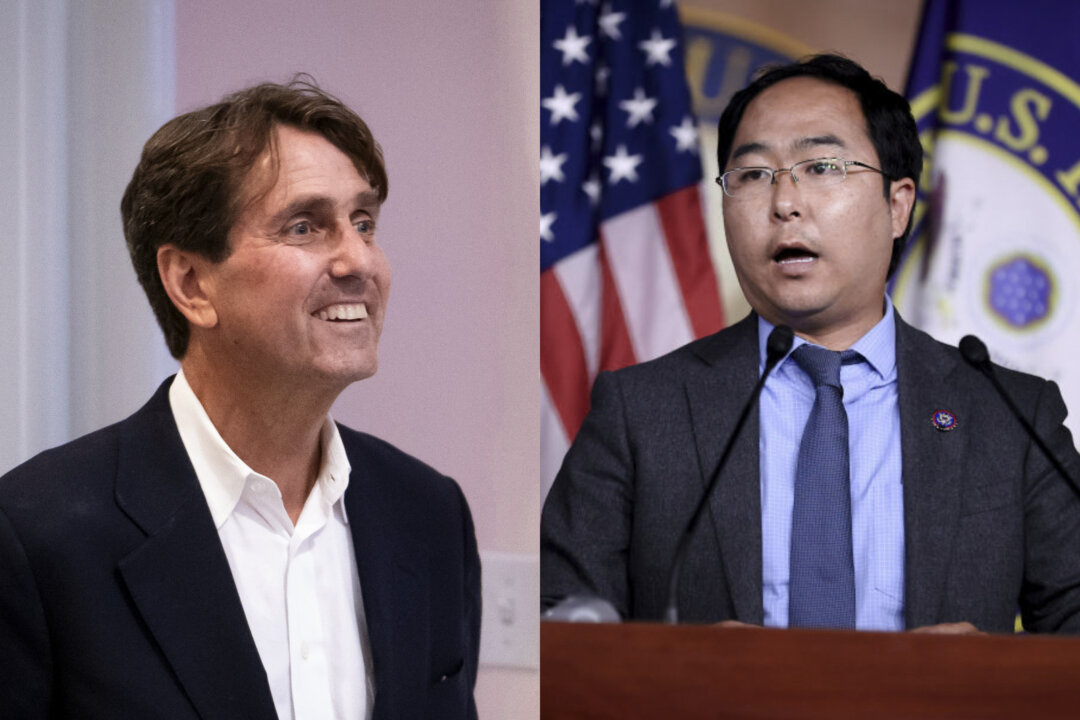The two men are seeking the seat that will be vacated by Democrat Bob Menendez, who resigned in August after being convicted on federal bribery charges.
Rep. Andy Kim (D-N.J) and Curtis Bashaw, his Republican challenger for one of New Jersey’s two U.S. Senate seats, squared off in their third and final debate of the election season on the night of Oct. 22.
The two men set forth starkly different visions and policy agendas on various topics, including taxes, the cost of living, immigration, and the Middle East conflict.
First elected to the House in 2018, Kim represents New Jersey’s Third Congressional District, an affluent and largely suburban area in the south-central part of the state. He originally planned to run against then-incumbent Democrat Sen. Bob Menendez until Menendez announced that he would not seek reelection.
Menendez resigned in August after being convicted on several federal bribery charges related to business partners and representatives of Egypt’s government. Bashaw has an entrepreneurial background with extensive experience in the hotel industry.
In the prerecorded debate, the candidates were allotted 90 seconds to respond to questions submitted in advance by Third District constituents and a shorter time to rebut what their opponent had said.
Kim described himself as in tune with the concerns of working people who are struggling with everything from housing costs to medical expenses and referred to his experience as a member of the House Committee on Small Business.
“This is the top issue that I hear about on the campaign trail, so many families struggling, that’s why I’ve made it my top priority,” he said before promising to fight to cap insulin costs at $35 per month and oppose tax breaks that he said would mostly or exclusively benefit the largest companies and the wealthiest citizens in the country.
Kim pledged to do his best “to make sure that we’re not susceptible to the global shocks that we saw before,” if elected to the Senate.
Bashaw disagreed on the factors that hamper economic growth in the state, arguing that businesses in New Jersey must contend with a thicket of regulations.
“I don’t think the solution to inflation is spending more money or old 20th-century price-cap models. We need to unshackle our businesses and grow our economy,“ he said. ”We cannot spend our way to prosperity; we cannot tax our way to fiscal health.”
Expanding on this theme, Bashaw said New Jersey ranks 49th out of the 50 states in terms of the financial investment it gets back from the federal government. He said this is a direct result of Democrats having held a monopoly for the past 50 years on the Senate seat for which he and Kim are competing.
The figure is all the more concerning when you take into account that New Jersey is one of the top donor states to the federal government, according to Bashaw.
“We need a Republican senator to give it a go. We’ve gone 50 years with two Democrats,” he said.
Kim responded by blaming the policies of former President Donald Trump, and the state and local tax (SALT) deduction in particular, for the state’s economic predicament.
“We have former President Trump who put forward this tax cap on New Jersey residents, something that was a direct attack on us and a number of other states,“ Kim said, claiming that Trump was ”giving huge tax breaks to the wealthiest Americans“ and that ”that’s not the priority that New Jersey families want.”
Bashaw reminded Kim that the congressman is not running against Trump for the Senate seat and described bloated bureaucracies as the source of the lengthy delays and other woes that led some commuters to dub the summer of 2024 as the “summer of hell.”
On illegal immigration, Kim highlighted his background in national security and counterterrorism and said he has supported bipartisan measures to secure the border.
Kim blamed the problem’s severity on a lack of judicial resources. He said 682 federal immigration judges must grapple with a backlog of 3 million cases. At the present rate and with the current resources, it would take 10 years just to get through that backlog, not including illegal immigrants who continue to arrive in the United States.
“We shouldn’t have six to eight years per immigration case, we should be able to do it in less than six months,” he said.

Bashaw questioned Kim’s record on the issue.
“You voted seven times against border security measures that were common sense. And we have maybe half a million illegals living in New Jersey,” Bashaw said.
“I understand, and I know from the field, that voters are very restless about this issue. It’s not only a safety and security issue; it’s about economics.”
Bashaw said that during a recent visit to the border, he watched 62 people walk unhindered into U.S. territory, some of them from Syria and some from China.
“We need to close the border, secure it now to illegal immigration. That’s just like locking your house at night when you go to sleep,” he said.
The two candidates also differed on Middle East policy, with Kim again highlighting his experience in national security and diplomacy and arguing that the Gaza conflict will be harder to resolve the longer U.S. leadership allows it to drag on.
Bashaw said Kim’s position was unclear and that he could not tell whether Kim was suggesting moral equivalency between Israel and its aggressors: Hamas, Hezbollah, and Iran.

